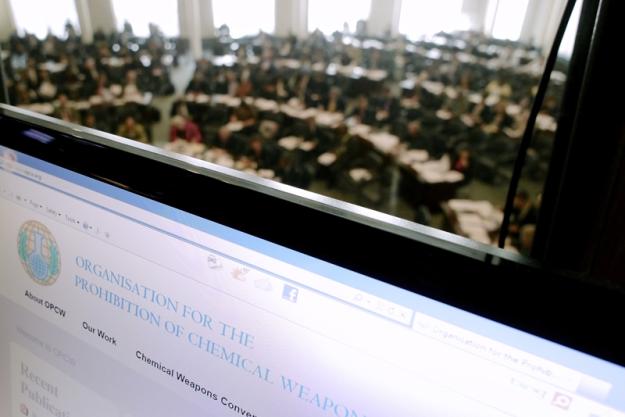
Image from a meeting of the OPCW Executive Council.
The Organisation for the Prohibition of Chemical Weapons’ (OPCW) Executive Council (EC) adopted by vote a decision today that expresses grave concern about and condemns in the strongest possible terms the use of chemical weapons in the Syrian Arab Republic, calls on all parties identified in the OPCW-United Nations (UN) Joint Investigative Mechanism (JIM) reports as responsible for chemical weapons use to desist immediately and authorises additional inspections at selected sites and facilities of concern in Syria.
The Executive Council decision follows the JIM’s recent findings, contained in its third and fourth reports, that the Syrian Arab Armed Forces and the so-called Islamic State of Iraq and the Levant (ISIL) have been involved in the use of chemical weapons and toxic chemicals as weapons.
The Executive Council expressed its deepest sympathy for the victims of chemical weapons attacks and its conviction that “every actor involved in these chemical weapons attacks should be held accountable”.
The continued interest in the development, acquisition, and use of chemical weapons by non-state actors and the potential for this threat to increase over time was also addressed by the Executive Council. It expressed its grave concern and underscored the essential role of the OPCW with respect to preventing and responding to the threat posed by non-state actors to the object and purpose of the CWC.
With the decision, the Council determined that necessary next steps include the OPCW Technical Secretariat undertaking, as soon as the security situation permits, further verification activities such as “conduct[ing] inspections in the Syrian Arab Republic at those sites identified by the OPCW-United Nations Joint Investigative Mechanism in its third and fourth reports, as involved in the weaponisation, storage, delivery, and use of toxic chemicals as weapons”.
The Executive Council’s decision further includes that the Technical Secretariat will conduct inspections, including sampling and analysis, at the Barzah facilities of the Syrian Scientific Studies and Research Centre (SSRC) as well as the Jamrayah SSRC facilities, twice a year on dates to be determined by the Secretariat. The Syrian Arab Republic is obliged to “facilitate promptly, and fully cooperate with, these inspections,” until the Executive Council decides to end them.
The Council expressed grave concern that all gaps, inconsistencies and discrepancies related to the initial declaration were not resolved and demanded that the Syrian Arab Republic comply fully with its obligations including the expeditious resolution of all outstanding issues regarding its declaration and related disclosures.
In addition, the Technical Secretariat is tasked with analysing any information or materials “relevant to existing or future allegations of chemical weapons possession or use”.
Background
The Executive Council is the executive organ of the OPCW and consists of 41 members from the five regional groups. The EC is responsible to the 192 members of the Conference of the States Parties. The EC promotes the effective implementation of the Chemical Weapons Convention (CWC), and compliance with it. The EC also supervises the activities of the Technical Secretariat. The Council cooperates with the National Authorities of Member States and facilitates consultations and cooperation among them at their request.
The OPCW Fact-Finding Mission (FFM) was set up in 2014 “to establish facts surrounding allegations of the use of toxic chemicals, reportedly chlorine, for hostile purposes in the Syrian Arab Republic”. The OPCW-UN Joint Investigative Mechanism was established by the UN Security Council (Resolution 2235, 7 August 2015) with the mandate to identify “to the greatest extent feasible” individuals, entities, groups, or governments who were perpetrators, organisers, sponsors or otherwise involved in the use of chemicals as weapons in Syria, where the OPCW FFM determines or has determined that a specific incident involved or likely involved the use of chemicals as weapons.
The Chemical Weapons Convention comprehensively prohibits the use, development, production, storage and transfer of chemical weapons. Any chemical used for warfare is considered a chemical weapon by the Convention. The OPCW is the implementing body for the Chemical Weapons Convention and oversees the global endeavour to permanently eliminate chemical weapons.
The Convention entered into force in 1997. With 192 countries obligating themselves to the CWC, it is the most successful disarmament treaty, eliminating an entire class of weapons of mass destruction. To date, over 93 per cent of all chemical weapon stockpiles declared by possessor states have been destroyed under OPCW verification. For its extensive efforts in eliminating chemical weapons, the OPCW received the 2013 Nobel Prize for Peace.
More information
- Executive Council Decision – OPCW-United Nations Joint Investigative Mechanism Reports on Chemical Weapons Use in The Syrian Arab Republic (EC-83/DEC.5), 11 November 2016
- Executive Council Decision – Destruction of Syrian Chemical Weapons (EC-M-33/DEC.1), 27 September 2013
- Letter dated 24 August 2016 from the Secretary-General addressed to the President of the Security Council, conveying the third report of the Organisation for the Prohibition of Chemical Weapons (OPCW) – United Nations Joint Investigative Mechanism:
- Letter dated 21 October 2016 from the Secretary-General addressed to the President of the Security Council, conveying the fourth report of the Organisation for the Prohibition of Chemical Weapons (OPCW) – United Nations Joint Investigative Mechanism
- UN Security Council Resolution 2235 (2015)
- UN Security Council Resolution 2118 (2013)
- Press Releases about OPCW and Syria
- OPCW Executive Council
- OPCW Fact Sheets
